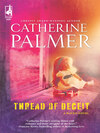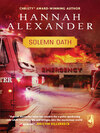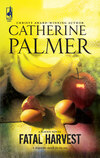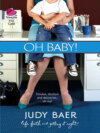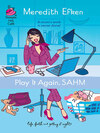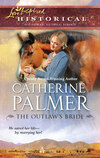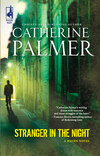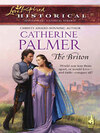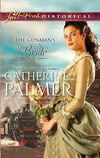Kitabı oku: «Thread Of Deceit», sayfa 2
Why this fascination with children? Prickles of alarm shot through Ana like thin, sharp needles at the memory of the way Terell’s hand had rested on little Brandy’s leg. The unhappiness in the girl’s blue eyes was palpable. She had kissed him, but had he slapped her only moments before?
“Tenisha, you’ve got me beat on this one,” Sam said, handing her the crochet hook and a tangle of yarn.
“Aw, you can do it, Uncle Sam.” She looked up at him. “You just have to try.”
“Tell you what, young lady. You play some basketball with me this afternoon—”
“No, I—”
“Now, don’t interrupt, Tenisha.” He held up a big index finger. “Remember the rules? Here’s a proposal for you. Try basketball this afternoon, and tomorrow I’ll come back and let you and Granny help me get started on crochet.”
“But I can’t play basketball, Uncle Sam. I can’t run hardly at all, y’know.”
“Well, how would I know that? I haven’t seen you ever try.”
She gazed down in her lap for a moment, her face glum.
“Do we have a deal?” he asked.
“Okay,” she said in a tiny voice.
“Great.” He gave her a solid pat on the back, and she brightened. Then he raised his voice to the other adult in the room. “Now, Granny, it’s time for activity change. These kids need to go try the tools.”
“What you talkin’ ’bout, boy?” The elderly woman squinted at him over the top of her glasses. “Fry the rules?”
“Tools!” he shouted, then muttered, “We’ve got to get you a hearing aid, Granny.”
As the youngsters scampered to their feet, Ana watched Tenisha lose her balance and stumble into a boy’s path. He barked in anger and gave her a shove. At that, Sam reached down and lifted the boy off his feet.
“Ladies first, Gerald,” he said as he held the youth high, giving Tenisha time to pick her way toward the door. Her unsteady gait revealed cerebral palsy, Ana surmised. So why had Sam Hawke urged the girl to attempt a sport that would only cause further embarrassment? Again, she felt the twinge of alarm and distrust.
Waiting for the group to file toward the toolroom, Ana noticed a figure seated in a shadowy corner at the end of the row of doors. She took a couple of steps closer and discerned a pair of skinny legs emerging from a green skirt. The girl wore the requisite white T-shirt and a pair of pink plastic sandals. Her hair, pulled back into a long braid, gleamed like black silk. She blinked at Ana, her large brown eyes wide.
“Hi.” Ana tried giving a little wave. She’d never been much good with children.
The girl looked away.
Well, that’s that.
Turning back, Ana nibbled a fingernail as she waited for Sam to complete the activity change. If Haven was as positive a place as it proclaimed, an article on the center’s activities might make a good feature for the Everyday section. She would suggest it to the editor.
Her own focus had to be the lead paint problem. Carl had wanted her to use Haven in the story, and she couldn’t very well turn it in without a single decent quote or even a pertinent fact or two about the place. She had to find out which parts of the building still contained the old paint, whether these children were at risk, how Sam intended to fix the problem, and where he would get the money to pay for it.
If the other sources on her list proved as uncooperative as this one, she would be hard-pressed to finish the series in two weeks. The memory of her editor’s promised reaction to such a failure chilled her. She tried to put it out of her mind. Why think the unthinkable?
As Sam stood at the door watching the new bunch of children settle in with Granny and her crocheting, Ana ventured another glance at the girl in the corner. Gazing back at the tall visitor, the child wore an expression of such emptiness, such sad hollowness, that Ana caught her breath. At the look on the girl’s face, a painful ache stirred to life inside Ana, and despite her best effort, she couldn’t immediately suppress it.
“Don’t you want to crochet?” Ana blurted out. She pointed to Granny’s room. “They’ve started a new group.”
The girl turned away in silence, her profile lovely and delicately haunting. Ana swallowed, wanting to go to the girl, to touch her somehow.
“Got the room switch taken care of.” Sam Hawke’s voice at her ear startled Ana. “Miss Burns, I need to ask you to leave now. We don’t allow anyone but volunteers and kids in the building unless they have a good reason.”
“I have a great reason,” she replied. “I want to interview you about your lead paint problem.”
His blue eyes fastened on her, and she knew exactly how an ant must feel as someone’s heel bore down on it.
“I’m not giving you an interview on Haven’s lead paint problem.” He enunciated each word as though she had as great a hearing loss as Granny. “Not today, not tomorrow, not ever.”
“I’ve been assigned this story,” she said as he turned his back on her and started toward the offices. She strode after him. “Haven will benefit from it. It’s obvious you serve needy kids here. Like that girl in the corner—”
“What girl?” He swung around.
“Tut-tut. No interrupting, sir.” She gave him a mock salute, then gestured behind her. “Back there. In the shadows. Who is she?”
He peered over Ana’s shoulder. “I haven’t been able to get her name. She showed up here a couple of weeks ago, but we can’t coax her out of the corner. She doesn’t speak English.”
“Now see? If Haven had to shut down because of the lead paint, that child might not have a place to go.”
“Haven is not going to shut down.”
“How are you planning to fix the problem?”
His face darkened. As a boy ran past with a basketball, Hawke snagged him. “Hey, Ramone, see Miss Burns to the door, would you?”
“Yes, sir.” The young man smiled. “C’mon with me, ma’am. You got to check out before you can go. And we need your T-shirt, too.”
Ana glared at Hawke’s broad-shouldered back as he headed toward his office. He thought he’d gotten rid of her. But he didn’t know Anamaria Burns.
No, sir.
He was staring through the window, thinking about what had happened in Springfield. Since the phone call from his associate three nights before, an acute pain had settled behind his eyes, and he had not slept well. Nothing could be resolved, of course, until he had more information.
What exactly had occurred that night? Who had done it? How much was known?
Despite the lack of details, he had begun working out his own answers to questions that might arise. He shouldn’t give the issue much weight, he reminded himself, because he really hadn’t been involved. The incident had occurred in another state, and he wasn’t responsible for it. If people didn’t take proper precautions, trouble usually found them, and they had no one but themselves to blame. Long ago, he had learned that he could not depend on anyone but himself to take care of things. No one had ever looked out for him, yet see how far he had come.
People counted on him now, and this gave him tremendous power. People feared him. They needed him. And he could demand their silence. Even if this particular situation blew up, he knew his colleagues would remain loyal. They would have no other choice.
As for himself, he would do just as he always had. Things would turn out well. He had organized everything so carefully, putting the building blocks in perfect order, setting each of the safeguards in place. He was cautious at all times, so that nothing could catch him by surprise.
Still, he jumped when his cell phone rang. Turning from the window, he put the phone to his ear as he dropped to the edge of a chair. “Yes?” Keeping his voice low, he spoke into the receiver.
“Hey, this is Sam Hawke over at Haven. How are you today, sir?”
The light tone jangled his nerves. He frowned. Not the call he’d been hoping for.
“Fine, and you?” he responded, forcing civility.
“Good.” There was a brief pause. “Listen, I thought I’d better let you know that someone from the Post-Dispatch dropped by today.”
“A reporter?” His nostrils flared as he took in air. “Why? What did he want?”
“It was a woman. She’s doing an article on our lead paint problem. I think Davidson may have put her up to it.”
“Davidson? Why would he do that?”
“I don’t know, sir. I can’t see how that kind of publicity can be good for us.”
“Absolutely not.”
“Maybe Davidson doesn’t see this situation the way I do, but I chose not to cooperate with the lady. We’re having enough trouble raising money without the newspaper dragging our name through the mud.”
“What did you tell this reporter?”
“That we’re aware of the problem and plan to fix it.”
“Good.” He dug a handkerchief from his pocket and blotted his forehead. The pain behind his eyes was intense. “I affirm your decision completely, Sam. You don’t need reporters nosing around there, that’s for sure.”
“I agree. I thought I’d better let you know in case Davidson mentions it.”
“Certainly. I’ll make sure he understands our point of view. I may give him a call right now, in fact. We need to be on the same page.”
“Great. Thanks, sir.”
“Listen, Sam…if she comes around again, let me know.”
“I doubt she’ll be back. I made my position clear.”
“Excellent. And again, thank you for the call. You were right to bring me up to speed. Anything like this…don’t hesitate to phone.”
“Will do. Better run.”
As the phone went dead, he let out a hot breath. Lovely. A reporter. He should have gotten a name. Clenching his fist around the phone, he turned back to the window.
He stood, stretched his stiff muscles and crossed toward the door. He needed to make some phone calls, but they could wait. Right now, he was going to have to do something about this headache. He hadn’t visited his special closet in many months, and he preferred to keep it that way. But commonplace antidotes didn’t work for him as they did for others. He was unique in so many ways. As usual, he would have to take care of himself. He always had.
Again I see the lightbulb, and I am glad. I close my eyes. Maybe if I close them, I can hide. I want to hide, because I am afraid. Afraid of the room. The terrible room. And the man. The good mean kind cruel love-me hurt-me man.
I say a prayer now. Thank you, God, for the lightbulb.
This is not a prayer I learned in church. My mother used to take me to church, but now we do not go. I have forgotten all those prayers.
I have not forgotten God. Has He forgotten me?
No. I know He is with me, because He gave me the lightbulb. When the pain begins, I open my eyes and look up at the ceiling. The white ceiling. Swirls and patterns, like a white river. Like snow on a river.
I see that lightbulb, and I am not afraid. It glows, shining into my eyes, and I stare at it. I stare and stare until my head hurts. I stare until the blackness comes. I command my eyes to travel into the light, into the whiteness of the bulb, the roundness, the glass, the ceiling, the swirls…
…and it is the sun, the bright sun, and I am running up the hill with my little sister. Come, Aurelia! Hurry up! Mama is calling. Can’t you hear her? We will be late for supper! We will miss our beans and tamales.
Green grass cools our bare feet as we run. Our wet skirts slap against our thighs. We played in the stream near our house today, looking for treasures. We found a tire and a shoe. We found a plastic bottle. We found a battery. Oh, such treasures!
Hurry, Aurelia! I hear her laughing behind me, and I tug on her small hand.
We reach the lane, warm brown stones under our feet. Hot dust swirling around our ankles. Broken glass—be careful, Aurelia! Watch where you are stepping! Don’t hurt yourself!
I take care of Aurelia, and she is safe with me. She laughs and laughs, as though missing our supper is part of the great adventure of this wonderful day. She knows I will get food for her, even if we miss the supper. Even if Mama puts everything away, I will find something for us to eat.
My feet bounce and skip and sing up the path, past the houses, past the wide porches and the children and the mamas and papas and the grandmas. I feel the sun shining on my face, warming my cheeks, kissing me with love. Oh, God, thank you for the sun! For the bright light. For Aurelia and the dusty path and the tamales waiting for us in our home.
Do I hear my mother’s voice? She calls! The smell of roses curls around me, and I am nearly home. Nearly there. I am coming, Mama! I am bringing Aurelia! She’s safe with me.
We run through the light, the heat, the brightness. We run up to our front door, out of breath, laughing, too silly to worry about tamales. I throw my head back, and my hair tumbles down behind me in a waterfall. The sun dances across my cheeks. I open my eyes and look into the sun, the bright white shining sun, the glowing glaring gleaming sun…
…and now I see that the sun is a round, white glass. It is small, and it hangs from the sky by a single black cord. It is the lightbulb. It has saved me again.
Thank you, God.
Chapter Two
S am spotted her the moment she stepped through the metal detector at the front door of Haven.
“Great,” he muttered.
Raydell Watson scowled as he followed the direction of Sam’s gaze. The brawny eighteen-year-old usually asked to work guard duty at Haven’s front door, and Sam had come to rely on him to keep troublemakers out of the recreation center. Despite Raydell’s youth, his dreadlocks, gold tooth and massive tattooed biceps made him an imposing barrier. He loved rap music, and his foul mouth had gotten him into trouble at the center more than once. A life spent mostly on the inner-city streets had hardened the boy at an early age. But to the best of Sam’s knowledge, Raydell had no gang or drug ties, and his loyalty to Haven was unquestionable.
A few minutes before, Raydell had relinquished his responsibilities to a younger boy and had come inside to cool off. Standing beside Sam, he watched the basketball game.
“It’s that newspaper reporter,” Sam said. “I’m supervising practice, and I don’t have time to talk to her this afternoon.”
Hadn’t he made it clear there would be no interview? Of course he had. But here it was just two days later, and she was back, sniffing around like a hound dog on a hot trail.
“Lucius, pick up your feet!” Sam barked as a boy barreled past, nearly tripping on his own sneakers.
“What’s a reporter want with you, man?” Raydell asked.
“The lead paint problem.” Sam had told the youth about the situation earlier. “She’s onto it. Keeps asking me questions that I don’t want to answer.”
“She don’t even see you standing over here,” Raydell observed. “Some reporter, huh.”
“I hope she doesn’t spot me, because I don’t intend to talk to her. I’ve only got two weeks left to come up with the money to fix the paint, and she could write things that would scare off donors. She could shut us down.”
“No way, man.”
“It’s possible. They say the pen is mightier than the sword.”
“Yeah, that’s why we carry guns in the hood.”
Sam cast the youth a skeptical eye. “And look what good it’s done you. No guns, my friend. And no reporters. I practically had to run her out of the building the other day. She’s trouble.”
“You already got enough of that.”
“No kidding.”
The woman headed straight for the office, head held high, dark brown hair swept up on top of her head like royalty. A queen expecting to command everyone in sight. What was her name? Burns or something, Sam recalled. She figured she was going to burn him. Splatter his sorry hide all over her newspaper. Slam the doors and lock them tight.
Not a chance. He had given his life to this place, and he believed without any doubt that God had commissioned him to the work he was doing with these children. Anything that rose against him became a part of the spiritual war he was fighting. And he certainly wouldn’t allow a prying reporter to sabotage his efforts.
At least she’d remembered the center’s rules and was wearing a plain white blouse. Tall and lean, she had the stride of a runway model as she crossed the floor in her belted slim gray slacks and high heels.
“Acts like she owns the place,” Raydell remarked.
Sam chuckled mirthlessly. “Yeah, comes gliding in here like a Stealth bomber out to do her damage.”
“Just let her try.”
“Calm down, Raydell. This is God’s battle.”
“She better not try nothing. Ain’t nobody messin’ with my people.”
Pumped up now, the young man was flexing his muscles and clenching his fists as if ready to knock the reporter out with a single punch. Sam shook his head and focused on the game again.
“Shoot, Abdul!” he shouted. “You’re in perfect position. Go for it!”
Raydell elbowed Sam and pointed to a heavyset teenager standing flat-footed beneath the basket. “Hey, look at Natasha. She got concrete shoes, or what?”
“Jump, Natasha!” Sam called out. “Get those feet off the floor, girl!”
Raydell threw back his head and laughed. “Aw, man, that’s pitiful! I’m going back outside where at least I got something interesting to watch.”
“Later, Raydell,” Sam said as the teen sauntered away. He glanced at his watch. Almost time for activity change. He would send Miss Burns packing as soon as he could hand over these kids to someone else. She had stepped into the office, and he could see her talking to Caleb. One hand on her hip, she leaned over and said something to the boy.
That’s right, Cleopatra. Try to work your wiles on a seventeen-year-old boy. It won’t get you what you want.
A moment later the office door opened and Caleb walked out. But instead of coming for Sam, he headed toward the row of small rooms where the younger children were doing crafts projects and listening to stories. The young man poked his head into one room after another. Finally, he headed up the stairs.
So that was her scheme. She knew she couldn’t get anything out of Sam, so she had set her sights on his Haven partner. Young Caleb had been sent off to fetch Terell Roberts while she sharpened her claws. Smooth move, Cleopatra, but—
“Uncle Sam, I think the basketball is flat, sir.” Tenisha tugged on the hem of his T-shirt. “It don’t bounce good, and Gerald keeps on stealin’ it away from me.”
He studied the orange basketball as players maneuvered it around on the makeshift court. “It’s still got air, Tenisha.”
“I can’t do it, Uncle Sam.” Her face crumpled as she clenched her fists. “I told you! I can’t play basketball. I can’t run.”
“Hey, now—what’s this I can’t nonsense? Is that how we talk at Haven?”
“No, sir, but I really can’t. My legs don’t work good ’cause of the palsy, and every time somebody throws me the ball, Gerald pushes me out of the way and takes it.”
Sam focused on the skinny boy with buckteeth that stuck out so far he had a permanent groove on his bottom lip. Gerald carried a massive chip on his shoulder because he’d been bullied for years about his appearance. The kid had learned that Tenisha made a handy target when he felt the urge to take his frustrations out on someone.
“Stealing the ball is part of the game, Tenisha,” Sam told her gently. “But pushing is illegal. Tell you what, next time Gerald pushes you, fall down flat and start wailing.”
“You mean crying?”
“Just let out a squawk loud enough to get the referee’s attention. Who’s ref today?” He glanced at the court. “Okay, see Patrick over there with the whistle? If you fall down and squawk, he’ll notice what’s going on and call it. Before too long, Gerald will foul out of the game.”
“Ain’t that cheatin’?”
“Not if he really pushes you. The pros do it all the time.” He paused as his line of vision centered on Miss Cleopatra Burns, notebook out and pen in hyperdrive, having a big confab with Terell.
“Hey, T-Rex!” he hollered. Then he patted the girl on the back. “Go on out there, Tenisha. Don’t let Gerald mess with you.”
Before the codirector of Haven could spill the beans about their problems with the health department, Sam hoofed it over to him. “Terell, this is the reporter I told you about, and we don’t—”
“Anamaria Burns,” she cut in, turning to him and sticking out her hand. “How are you this afternoon, Mr. Hawke?”
“Not happy to find you back here.” He took her thin, strong hand and gave it a hard squeeze. “I told you we don’t have anything to say about paint.”
“That’s what I’ve been trying to tell her,” Terell spoke up. “This lady doesn’t listen, man.”
Sam regarded his best friend. Terell was the color of rich, dark coffee, but otherwise he looked like Sam’s twin. However, while Sam was the keeper of rules and the master of the clock, Terell functioned as Haven’s mascot. A teddy bear.
Today, as usual, a child hugged him, small arms wrapped around the man’s large leg as if clinging to a tree trunk. He held a little girl with blond hair on his back, her cheek resting on his head and her arms around his thick neck. She was asleep.
“Terell and I discussed this the other day,” Sam told the reporter. “We don’t think it’s a good idea to talk to you.”
“She won’t take no for an answer,” Terell said. “She keeps on saying she’ll write about the good we’re doing here.”
“She’s going to make a big deal about the paint.”
“I can write the article any way I want,” the reporter interjected.
“I’ve been burned by the press before,” Terell added. “But I don’t know, Sam. Maybe she could help us.”
“Does my opinion carry any weight around here?” Sam shot back.
“Not as much as you like to think, dog,” Terell replied. As he spoke, his face split into a grin, and his distinctive deep laugh rolled up out of his chest. He guffawed for a moment, the little boy who clung to his leg joining in with a giggle.
Sam turned on Cleopatra. “Is that the focus of your story, Miss Burns? The good things we do at Haven?”
“Well, no, but—”
“That’s what I thought. You’re going to write about our building, and how we don’t meet city code and the health department is breathing down our necks.”
“How long do you have to fix the paint problem?” she asked.
“Two weeks,” Terell said.
Sam rolled his eyes. “Way to spill the beans, T-Rex.”
“Two weeks is not long.” She scribbled on her notepad. “Are you planning to raise funds, or do you have an account set up for emergencies?”
“An account!” Terell started laughing again. “Did you see any of these kids pay to get in here? None of our donors are handing over enough money to set aside extra, ma’am. We pulled together the start-up money from what was left after my NBA days with the Magic, and now we’re basically what you’d call a charity case.”
“You played professional basketball, Mr. Roberts?” she asked, writing fast.
Sam eyed his friend in dismay. “You’re going to give her enough for a book, aren’t you, Terell? Sure, tell her everything.”
“No way, man. Not about DFS and all that.”
“Division of Family Services?” Ana spoke up. “They have a problem with Haven, too?”
“I can hardly wait to read the article,” Sam growled.
“Well, why don’t you handle it then?” Terell glanced at his gold Rolex watch, one of the few remaining luxuries from his once-lucrative career. “It’s time for activity change, anyhow. I’ll take care of it, and you talk to Miss Burns.”
“I don’t want to talk to her. I want her to leave.”
“Listen, Mr. Hawke,” she said. “I already have enough information here to include Haven in my article, so you might as well fill in a few holes. I can always talk to DFS myself.”
Sam stared at Terell. Terell stared back. Ever since their basketball days at Louisiana State University, the two had butted heads. Sam was intense, driven, edgy. Terell loved everyone, saw the silver lining in each situation and would give away his last dime. Sam had practiced on the basketball court for hours, honing his skills, pushing himself to his limits. Terell arrived late to practice, barely passed his college classes and led the team to one victory after another on raw talent. Sam trusted no one. Terell believed the best about everyone he met. So-called friends had conned, manipulated and cheated him out of most of his money, yet he never held a grudge. The two men loved each other like brothers.
“I’ll talk to her,” Sam said finally. “You’ve got five minutes, Miss Burns.”
“Ana.” She smiled, radiant and suddenly prettier than he’d realized.
“Shall we go to my office?” he asked. “It’s quieter.”
“Your office?” The smile vanished. “We can talk here. I don’t have a problem with noise.”
He studied her for a moment, observing the brown eyes and reading in them something he hadn’t expected. Fear. So, Miss Ana Burns had a chink in her armor. She didn’t want to go into his office. His turf. Seeing an advantage, he seized it.
“I’d like to sit down,” Sam told her. “Been on my feet all day, you know. Follow me.”
“But…” she tried. “But I…”
Ana matched his stride as Sam headed across the room. Unusually long legs, he noted. Most women barely reached his shoulder, but a tilt of this one’s head would put her face disconcertingly close to his.
Military training had taught Sam the art of inspection, and instinct took over despite his determination to ignore the pesky reporter. Her firm chin and aquiline nose created a sharp profile, he noted, which was softened by large brown eyes and full lips. Squared shoulders eased into gentle curves. Her topknot had clearly started the morning tightly coiled. But the day had loosened it, and now wisps of dark hair trailed around her ears and down the back of her long neck. The combination of prickly and soft intrigued Sam—which in turn, irritated him no end.
A short distance away, Terell blew the whistle for activity change. Like jelly beans, kids poured out of the little classrooms, down the stairs and across the basketball court. Despite his annoyance at her intrusion, Sam felt glad that the reporter was seeing the large numbers of children and teenagers who had found a secure place to spend their summer days.
Without Haven, most would be loitering on the streets, vulnerable to the drug dealers, drive-by shootings, prostitution and gang activity that proliferated in these neighborhoods. Here, they stood a much greater chance of not becoming a statistic—one of the hundreds of young men who ended up in hospital emergency rooms with knife or bullet wounds, or one of the countless unmarried teenage girls who became pregnant each year.
Giving them hope was Sam’s passion. His mission. He had blown assignments in the past. Made mistakes. Fatal flaws. This time he would not fail.
He stepped into the front office and clapped a hand on Caleb’s back. “How’s the computer, buddy?”
“A pile of junk.” Caleb squinted into the screen as he spoke his familiar refrain.
“Hey, get on the Internet and see if you can dig up a little dirt on somebody for me—her name’s Ana Burns.”
“There’s no modem on this old thing, sir, and I—” Caleb glanced up, saw the woman, and then laughed in embarrassment. “Oh, hey there, Miss Burns.”
“Hello, Caleb.”
“I thought you wanted to talk to Terell.”
“I intended to, but it looks like I’m stuck with Uncle Sam.”
The teen grinned. “Lucky you.”
“By the way,” she addressed Sam as they walked down a short hallway to his personal office. “My name is Anamaria Cecilia Guadalupe Burns, and you won’t dig up any dirt on me. I’m clean. Your dog can vouch for that.”
“Your name…you’re Hispanic?” he asked, pulling the door shut behind him and pointing her to a chair.
She stood statuelike, eyeing the room, her knuckles white on the handle of her purse. Then, moving suddenly, she turned and jerked open the door. With two quick paces, she stepped to the chair and sat, her hips on its edge as though she intended to leap up at any moment.
“I prefer the term Latina, ” she said, flipping open her reporter’s notebook. “My mother was born and raised in Mexico. My father’s ancestors came from Scotland. I grew up in Brownsville, Texas, graduated from UTB with a degree in English and worked at the Brownsville Herald before moving here five months ago.”
“Ah,” he said, taking a seat behind his desk.
“And you?”
“Wyoming.”
“What brought you to St. Louis?”
“Haven.” He straightened a stack of papers, tamping the edges before setting them back on his desk. “I thought this interview was about lead paint.”
“And I thought you wanted a broader story.”
“You don’t need my background for that. Write about the kids. Most live in government-subsidized housing projects. Few have a father in the home. We have a mix of African-American and Caucasian, but we—”
“So I’ve observed.” Her eyebrows lifted like a pair of raven’s wings. “Sorry to interrupt, but would you mind if I asked the questions?”
Sam leaned back in his chair and laced his fingers across his stomach. The lady was a major pain.
“I like your office, by the way,” she said, brown eyes flashing from one side of the small room to the other. Long dark lashes curled up almost to her eyebrows. “Orderly. Neat. But you ought to clean the front area. That pile of wet towels is sprouting mold.”
“Would you like to take over management of our laundry room, Miss Burns?”
“It’s Ana, and the posters are peeling off the walls out there, too. That office is a wreck.”
“We have lead paint in our laundry room,” he informed her. “I can’t let the kids work there anymore, because the paint is peeling even worse than those posters out front. So our towel mass is becoming critical, and we could use an adult to help out.”
